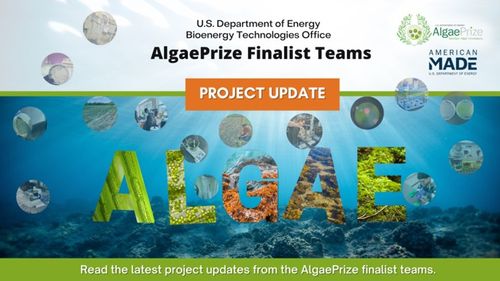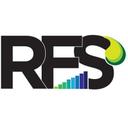DOE: AlgaePrize finalist teams make great strides in projects to unlock algal energy

SOURCE: U.S. Department of Energy
July 16, 2024
BY U.S. Department of Energy
Since being selected as finalists for AlgaePrize 2023–2025, student teams from across the country have been rolling up their sleeves to turn smart research proposals into results. Now only approximately five months into the competition, the U.S. Department of Energy Bioenergy Technologies Office is thrilled to celebrate the progress they have already made.
As reflected in the updates below, the teams are making great strides in 15 unique projects that aim to unlock algal energy from a variety of angles—from improving commercial seaweed cultivation to making nanomaterials from macroalgae, predicting prime locations for future algae farms with machine learning, and beyond.
- AlgaeNano+ (University of Puerto Rico – Rio Piedras Campus, San Juan, Puerto Rico): designed and implemented an eco-friendly protocol for producing carbon nanomaterials from algae and designed a low-temperature, reduced-energy protocol using Sargassum.
- AlgaeUnlocked (Southern Illinois University Carbondale, IL): optimized the use of oxidative hydrothermal dissolution to process Chlorella biomass.
- Algators (Livingston High School, Livingston, NJ): cultivated both Chlorella and Hematococcus for terrestrial crop fertilizer optimization trials.
- Aloha Limu (University of Hawaii at Hilo, HI): rehabilitated an existing aquaculture facility by constructing novel, vertical, space-saving seaweed photobioreactors.
- BlazerBloom (Hood College, Frederick, MD): developed a high-risk, high-reward strategy by using naturally magnetic bacteria to flocculate and magnetically harvest microalgae for biofuel production.
- Blue Genes (Solano Community College, Fairfield, CA): cultivated Spirulina, extracted phycocyanin using a variety of strategies, and engaged in outreach events.
- Clean Green Feed (University of Connecticut, Storrs, CT): rejected autotrophic and heterotrophic cultivation in favor of mixotrophic protocols and established optimum parameters.
- Green Skies (The Blake School, Minneapolis, MN): established a relationship with Pacific Northwest National Laboratory and acquired access to the Biomass Assessment Tool and TanDemX.
- Green Thumbs (Colorado School of Mines, Golden, CO): developed marine electroflocculation using pH control without electrode degradation.
- JCCC Chlorella Cavaliers (Johnson County Community College, Overland Park, KS): optimized the growth of Chlorella cultures and developed transgenic protocols, including novel primers for the transformed alga containing plastic-degrading enzymes.
- Just AD Algae (Sante Fe Community College, Sante Fe, NM): focused on the cultivation of Chlorellavulgaris to yield biomass for metabolizing cooking oil and producing biogas.
- KelBerry (University of Connecticut, Storrs, CT): developed and adopted sugar kelp processing protocols.
- Parachlorella Plastic Pals (University of California San Diego, La Jolla, CA): focused on optimizing Parachlorella cultivation and extracting free fatty acids, including C18:2 and C18:3.
- Team ASAP (Camas High School, Camas, WA; Belmont High School, Los Angeles, CA; Irvine High School, Irvine, CA): developed protocols to maintain the gametophytic stage of kelp life histories (Saccharina latissimi, Macrocystis pyrifera, and Nereocystis luetkeana) for just-in-time production of sporophytes, as well as identified and customized CRISPR protocols.
- The Algenius Thinkers (The University of Texas at Austin, Austin, TX): cultivated the model organism, Phaeodactylum tricornutum, which is the focus of genetic modification efforts, and identified a plasmid for initial experimental procedures.
BETO wishes everyone luck as they edge closer to the AlgaePrize Competition Weekend in April 2025, when teams will present their results and judges will select the grand champion. Until then, stay tuned for future updates on the teams’ projects, and visit the AlgaePrize Competition webpage to learn more.
Advertisement
Advertisement
Related Stories
MOL Group has produced a diesel fuel containing hydrotreated vegetable oil (HVO), and sustainable aviation fuel (SAF) at the refinery of Slovnaft in Bratislava. The quality of the products has been verified by radioisotope analysis.
More than 1.76 billion renewable identification numbers (RINs) were generated under the Renewable Fuel Standard in January, down from 1.91 billion generated during the same period of 2024, according to data released by the U.S. EPA on Feb. 20.
The U.S. EPA on Feb. 20 released updated small refinery exemption (SRE) data showing that 13 previously denied SRE petitions for Renewable Fuel Standard compliance years 2021 and 2022 are being reconsidered. No new SRE petitions were filed.
A coalition of biofuel, agriculture, fuel retailer and petroleum trade groups on Feb. 19 sent a letter to U.S. EPA Administrator Lee Zeldin urging the agency to set robust, timely, multiyear RFS RVOs for 2026 and beyond.
OMV Petrom has announced the start of construction for a sustainable aviation fuel (SAF) and renewable diesel (HVO) production unit at the Petrobrazi refinery in Romania. The new facility will have an annual capacity of 250,000 tons.
Upcoming Events










